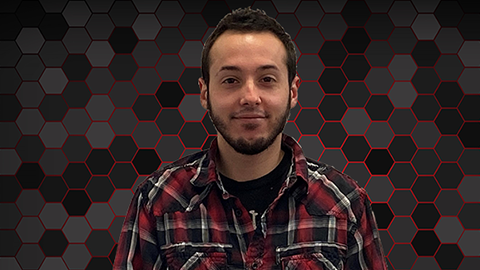Working on sustainable science in industry
For this week’s column, I talked to Jake Courtney of Conagen, a biotechnology company that focuses on synthetic biology.
For Courtney, a research career in industry has brought a sense of purpose and fulfilment.
Deciding on science from the start
Courtney said he was interested in science even from a young age, so he decided to pursue a career in research.
“(Science is) a part of everyday life, and I wanted to learn as much as I could,” he said. “A career in science gives me the opportunity to learn something new each day, maybe even discover something novel.”

He earned a bachelor’s and then a master’s degree from the College at Brockport State University of New York, where he focused on molecular biology and genetics. He decided he wanted to pursue a career in biotechnology partly because he was inspired by the work he saw happening in that space and the pace at which new discoveries were being made.
He also started to think about how these discoveries would affect not only patients but our environment as well.
“I think it’s important to have a career that gives a sense of purpose or fulfillment,” he said. “These new discoveries, tools and products, which are meant to make life easier or improve quality of life, must also be sustainable.”
This was part of the reason he pursued a career at Conagen, which has developed platforms to make environmentally friendly and sustainable bioproducts that can be used in commercial applications. In his role as Scientist II, Courtney works on developing bacterial strains that are engineered to produce these useful chemical products.
“Billions of years of evolution have provided us with a huge array of natural products and microorganisms with the means to produce them,” he said. “So why not use that to our advantage in a way that’s environmentally friendly and commercially feasible at the same time?”
Who’s who
Before we talk about the specifics of his job, let’s get into some nomenclature.
If you’ve looked for industry jobs already, you may have noticed that the research scientist positions are delineated by numbers — typically scientist I, scientist II and senior scientist. While the exact definitions and responsibilities will vary from company to company, a scientist I position is typically entry level and geared toward those with less experience in the given industry.
Scientist II positions typically require at least two or three years of experience and involve more complex projects.
Then, researchers can advance to senior scientist positions, which have more of a managerial component.
Scientists enter this pipeline at various points, and the roles and responsibilities will greatly vary based on their projects, divisions and companies.
Courtney is a scientist II. Specifically, he engineers strains of yeast to make products they don’t normally produce: terpenes, which are often aromatic compounds normally produced by plants, and carotenoids, which are pigments typically found in plants, algae, and photosynthetic bacteria. These compounds can then be used in other commercial applications, including in fragrances, as natural food flavors, in medicines, and as natural food and cosmetic colorants.
Courtney said he has a hands-on role during the development process of each strain. In terms of techniques, he said his typical day might involve designing DNA constructs, modifying, validating and culturing yeast and bacterial strains, and translating procedures to automated platforms as they become available.
He said his role has expanded as the company has expanded.
Preparing for the job
Courtney started looking for biotech jobs when he was fresh out of grad school. He cast a wide net but mainly applied for research-based positions.
Before applying for a job, he said, he did his homework. “I’d learn as much as I could about the company and try to get a sense of their work environment,” he said. “It was important for me to find a company where I could grow as a scientist and be involved as much as possible. I didn’t want to be stuck doing the same thing every day.”
In his current research role, Courtney said, he’s had many opportunities to grow and try new and exciting experiments. He has a few key pieces of advice for those looking to also find a research position in industry.
The first is not to limit yourself — apply for different research positions at various companies irrespective of your training history. “Regardless of what you study, a lot of techniques are the same so don’t limit yourself to just one area,” he said. “You can always research more background information and move forward from there.”
Along the same lines, Courtney said not to be afraid of hard work. “It’s a competitive field, and science doesn’t always go as planned,” he said. “But if you’re willing to put forth the effort people will take notice.”
Lastly, he has a tip that’s practically become law in these industry career columns: “Teamwork and communication are key,” he said. “It’s important to trust your team — learn as much as you can from more experienced team members, and lead by example when you’re training someone.”
Research is vast and varied, regardless of where you’re conducting it. So, if you’re thinking of pursuing a career in industry research, heed Courtney’s advice: Do your homework, and don’t limit yourself.

A zest for synthetic biology
Metabolic engineers are trying to overcome the challenges of mass-producing commodity chemicals, such as limonene, an oil from orange peels. Read our feature.
Enjoy reading ASBMB Today?
Become a member to receive the print edition four times a year and the digital edition monthly.
Learn moreFeatured jobs
from the ASBMB career center
Get the latest from ASBMB Today
Enter your email address, and we’ll send you a weekly email with recent articles, interviews and more.
Latest in Careers
Careers highlights or most popular articles

Defining JNKs: Targets for drug discovery
Roger Davis will receive the Bert and Natalie Vallee Award in Biomedical Science at the ASBMB Annual Meeting, March 7–10, just outside of Washington, D.C.

Upcoming opportunities
No matter where you are in your career and what future path you aspire to, everyone needs leadership skills. Join ASBMB for practical strategies for building and practicing leadership skills.

Close out ASBMB 2026 with a bang
The closing reception of the 2026 ASBMB Annual Meeting will be held at the Torpedo Factory Art Center in Alexandra, Virginia.

Redefining lipid biology from droplets to ferroptosis
James Olzmann will receive the ASBMB Avanti Award in Lipids at the ASBMB Annual Meeting, March 7–10, just outside of Washington, D.C.

Creating change in biochemistry education
Pamela Mertz will receive the ASBMB William C. Rose Award for Exemplary Contributions to Education at the ASBMB Annual Meeting, March 7-10 in Washington, D.C.

Trainee mentorship as immortality
Suzanne Barbour will receive the ASBMB Sustained Leadership Award at the ASBMB Annual Meeting, March 7-10 in Washington, D.C.

